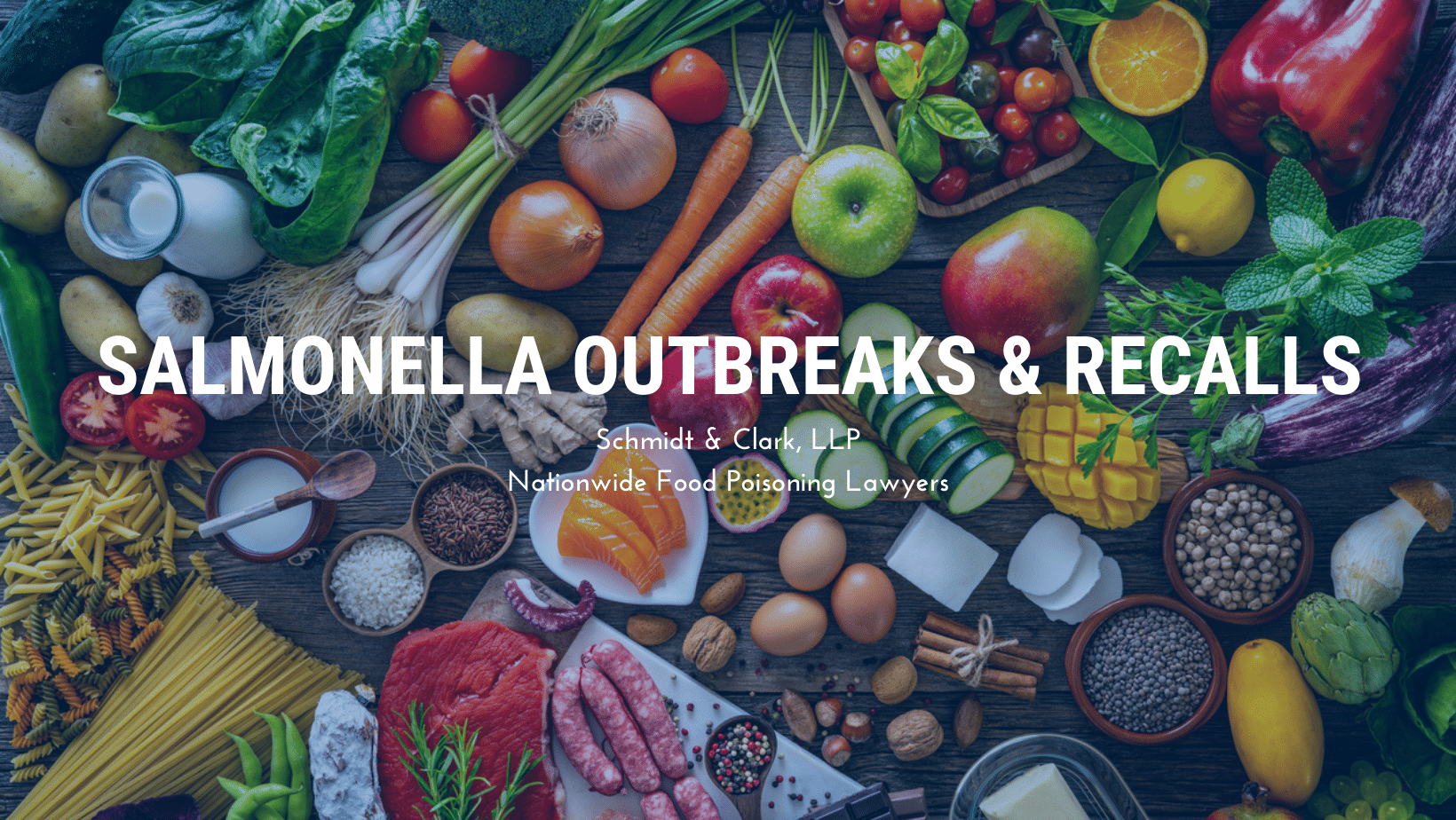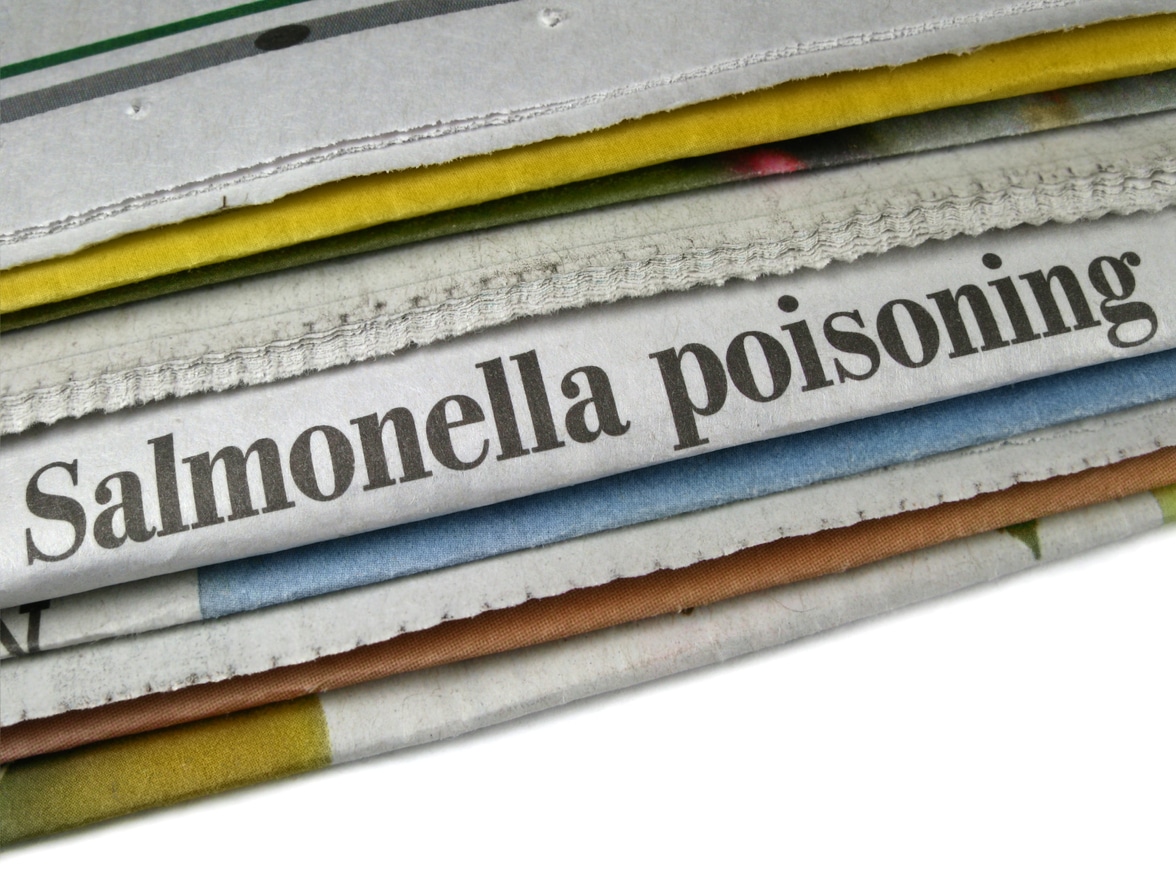Please click the button below for a Free Confidential Case Evaluation or call a salmonella lawyer toll-free 24 hrs/day by dialing (866) 588-0600.
Table Of Contents
- Salmonella Lawsuit Overview
- Latest Salmonella Lawsuit Updates
- FDA Reports and Statistics
- Salmonella Infections & Side Effects
- Do You Qualify for a Salmonella Lawsuit?
- Salmonella Outbreak Information
- Statute of Limitations for Salmonella Lawsuits
- FAQs
- 1. What is Salmonella and how does it cause food poisoning?
- 2. What foods commonly cause Salmonella poisoning?
- 3. How is Salmonella infection diagnosed?
- 4. What treatment is available for Salmonella poisoning?
- 5. Who is most at risk from Salmonella infection?
- 6. How do I prove my Salmonella case is linked to a specific food?
- 7. What legal options are available if a loved one was harmed by consuming contaminated food?
- 8. Can I still join a lawsuit if my health issues from consuming contaminated food were mild?
- 9. How can an attorney help with a Salmonella lawsuit?
- Get a Free Salmonella Lawsuit Evaluation With Our Lawyers
Salmonella Lawsuit Overview
Salmonella lawsuits center on foodborne illness caused by consuming products contaminated with Salmonella bacteria.
These legal actions typically target food manufacturers, restaurants, and retailers who failed to maintain proper food safety standards.
According to the CDC, approximately 1.4 million cases of salmonellosis occur each year in the United States, with 95% of those cases being foodborne-related.
The CDC also reports that about 500 to 1,000 deaths (31% of all food-related deaths) are caused by Salmonella infections annually. These cases have resulted in numerous recalls and legal actions against responsible parties.
Latest Salmonella Lawsuit Updates
- August 26, 2025 – A suspected Salmonella outbreak at the Hotel Izán Cavanna in La Manga, Spain, has affected over 100 guests, including a 15-month-old baby and several children [6]. The illness began after a lunch on August 23, with symptoms such as vomiting, diarrhea, abdominal pain, and fever reported among guests. Authorities are investigating the source, with a spinach-filled pasta dish being a potential cause, and have temporarily closed the hotel’s kitchen for cleaning.
- December 2, 2024 – The CDC and FDA are actively investigating sixty-eight cases of Salmonella infections linked to cucumbers distributed by SunFed Produce, LLC across 19 states. The company has recalled products sold between October 12 and November 26, 2024 [1].
- August 22, 2024 – A settlement was reached in the Bedner Growers, Inc. cucumber outbreak case that caused 551 illnesses across 34 states. This marks the resolution of one of the largest produce-related Salmonella outbreaks in recent years [2].
- December 18, 2023 – Health officials contained a Salmonella outbreak linked to a potluck event at Hope International Church in Seattle that caused seven illnesses and one hospitalization [3].
- September 23, 2020 – Wismettac Asian Foods recalled dried fungus due to Salmonella contamination after 55 infections were reported across 12 states [4].
FDA Reports and Statistics
According to data from the Centers for Disease Control and Prevention (CDC) and the Food and Drug Administration (FDA):
- 1.4 million cases of salmonellosis occur each year in the United States.
- 95% of those cases are foodborne-related.
- Approximately 220 of each 1000 cases result in hospitalization.
- 8 of every 1000 cases result in death.
- About 500-1,000 deaths annually (31% of all food-related deaths) are caused by Salmonella infections
Recent significant outbreaks include:
- 551 illnesses across 34 states from Bedner Growers cucumbers (2024)
- 68 cases across 19 states from SunFed cucumbers (2024)
- 1,127 infections across 48 states from red onions (2020) [5]
Salmonella Infections & Side Effects
Salmonella infections can cause a range of symptoms and potentially serious complications, particularly in vulnerable populations.
• Common Symptoms: Fever, diarrhea, abdominal cramps, headache, nausea, and vomiting that typically appear 12-72 hours after exposure.
• Dehydration: Severe diarrhea can lead to dangerous levels of dehydration requiring medical intervention.
• Bacteremia: Life-threatening bloodstream infection that can spread to the brain (meningitis), heart (endocarditis), bones (osteomyelitis), and other body parts.
• Sepsis: Potentially fatal inflammatory response triggered by chemicals released to fight infection.
• Reactive Arthritis: Eye irritation, painful urination, joint pain, and other symptoms that may develop following infection.
• Colitis: Inflammatory reaction in the colon that can cause ongoing digestive issues.
Do You Qualify for a Salmonella Lawsuit?
You may qualify for a Salmonella lawsuit if:
- You consumed a food product that was later identified in a Salmonella outbreak or recall
- You experienced Salmonella symptoms within 12-72 hours after consuming the contaminated food
- You sought medical attention and were diagnosed with a Salmonella infection
- Your infection was confirmed through laboratory testing (stool sample or blood test)
- You have evidence linking your illness to a specific food product or establishment
- You experienced significant health consequences requiring medical treatment
- You file your claim within the statute of limitations for your state
Evidence Required for a Salmonella Lawsuit
Strengthening your case requires gathering proper documentation including:
- Medical records confirming your Salmonella diagnosis through laboratory testing
- Receipts, credit card statements, or other proof of purchase of the contaminated food
- Food packaging or leftover food samples if available
- Symptom diary documenting the onset, duration, and severity of your illness
- Evidence that the food you consumed was part of a known outbreak or recall
- Medical bills and documentation of expenses related to your illness
- Employment records showing missed work and lost wages
Damages You Can Recover
Victims of Salmonella food poisoning may be entitled to compensation for:
• Medical expenses including hospitalization, medications, and follow-up care
• Lost wages from missed work during illness and recovery
• Pain and suffering from physical discomfort and emotional distress
• Long-term health consequences resulting from complications
• Out-of-pocket expenses related to your illness
• Punitive damages in cases of gross negligence
Salmonella Outbreak Information
Recent significant Salmonella outbreaks include:
Cucumbers – Imported from Mexico (2024)
- 68 reported illnesses across 19 states
- Products recalled: Cucumbers distributed by SunFed Produce, LLC
- Recall dates: Products sold between October 12 and November 26, 2024
- Status: Active investigation by CDC and FDA
Cucumbers – Bedner Growers, Inc. (2024)
- 551 illnesses across 34 states
- Products affected: Cucumbers distributed by Bedner Growers
- Status: Resolved with settlement reached August 22, 2024
Raw Milk – San Diego County (2023-2025)
- 9 reported cases with 3 hospitalizations (all children)
- Product: Raw milk from Fresno-based Raw Farm LLC
- Status: Active investigation as of January 5, 2025
Onions (2020)
- 1,127 infections across 48 states
- Product: Red onions from Thomson International Inc.
- Resolved with recall and no further cases reported
Statute of Limitations for Salmonella Lawsuits
The time limit to file a Salmonella lawsuit varies by state, typically ranging from 1-3 years from the date of illness or discovery of the connection between your illness and the contaminated food.
These deadlines are strict, and failing to file within the specified timeframe can result in losing your right to pursue compensation.
Some states have different statutes for personal injury claims versus product liability claims, so it’s essential to consult with an attorney as soon as possible to determine the applicable deadline in your jurisdiction.
FAQs
1. What is Salmonella and how does it cause food poisoning?
Salmonella is a group of bacteria that causes infection when people ingest contaminated food or water. Once inside the body, the bacteria target the intestines, triggering symptoms like diarrhea, fever, and abdominal cramps typically within 12-72 hours after exposure. The infection can spread beyond the intestines in severe cases.
2. What foods commonly cause Salmonella poisoning?
Common sources include raw or undercooked meat, poultry, eggs, unpasteurized dairy products, and unwashed fruits and vegetables. Recent outbreaks have been linked to cucumbers, onions, mushrooms, peaches, and raw milk.
3. How is Salmonella infection diagnosed?
Diagnosis requires laboratory testing of a specimen, typically a stool sample or blood test. A positive test for Salmonella bacteria confirms the infection and can help guide treatment decisions.
4. What treatment is available for Salmonella poisoning?
Treatment typically involves replacing fluids and electrolytes to prevent dehydration. Severe cases may require hospitalization for intravenous fluids. While antibiotics aren’t usually necessary for mild cases, they may be prescribed for severe infections or high-risk patients.
5. Who is most at risk from Salmonella infection?
While anyone can contract Salmonella, those at highest risk include children under 5, elderly individuals, pregnant women, and people with weakened immune systems. These groups are more likely to develop severe illness requiring hospitalization.
6. How do I prove my Salmonella case is linked to a specific food?
Proving your case typically requires establishing that you consumed a food product later identified in an outbreak, experienced typical symptoms within the expected timeframe, received a medical diagnosis confirming Salmonella, and can demonstrate the connection through receipts, medical records, and outbreak investigation data.
7. What legal options are available if a loved one was harmed by consuming contaminated food?
If a loved one was harmed, you might be eligible to file a personal injury or wrongful death lawsuit, seeking compensation for medical expenses, lost wages, pain and suffering, and emotional distress.
8. Can I still join a lawsuit if my health issues from consuming contaminated food were mild?
Yes, even if your health issues were mild, you may still be eligible to join a lawsuit and seek compensation for any related costs and inconveniences, though cases with documented medical treatment typically receive higher compensation.
9. How can an attorney help with a Salmonella lawsuit?
An attorney can help by gathering evidence, filing the lawsuit, negotiating with defendants, and representing you in court. They can also ensure your rights are protected throughout the process and maximize your potential compensation.
See all related food poisoning lawsuits our personal injury attorneys covered so far.
Get a Free Salmonella Lawsuit Evaluation With Our Lawyers
Time is limited to pursue legal action for illnesses related to Salmonella food poisoning. Most states allow only 1-3 years from the date of illness to file a claim, and this window may be closing rapidly in your case.
At Schmidt & Clark, LLP, we offer:
- Free, confidential consultations to evaluate your potential claim
- No upfront costs or legal fees
- Payment only if we win your case and secure compensation
- Nationwide representation with extensive experience in foodborne illness litigation
Don’t wait until it’s too late to seek justice and compensation for your illness. Contact our experienced legal team today to understand your rights and options.
Call the food poisoning lawyers with Schmidt & Clark, LLP by dialing (866) 588-0600 or fill out the contact form below to get your free case review.
References
- https://www.cidrap.umn.edu/salmonella/new-68-case-salmonella-outbreak-linked-cucumbers-mexico
- https://www.prnewswire.com/news-releases/marler-clark-files-first-federal-cucumber-lawsuit-against-grower-linked-to-two-salmonella-outbreaks-302481224.html
- https://kingcounty.gov/en/dept/dph/health-safety/disease-illness/foodborne-illness-outbreaks/2023-nov-12-hope-international-church
- https://www.foodsafetynews.com/2020/09/salmonella-finding-prompts-recall-of-dried-imported-edible-fungus/
- https://archive.cdc.gov/#/details?url=https://www.cdc.gov/salmonella/newport-07-20/index.html
- https://people.com/over-100-people-including-baby-fall-ill-suspected-salmonella-outbreak-hotel-reports-11796656

 Published by
Published by 


